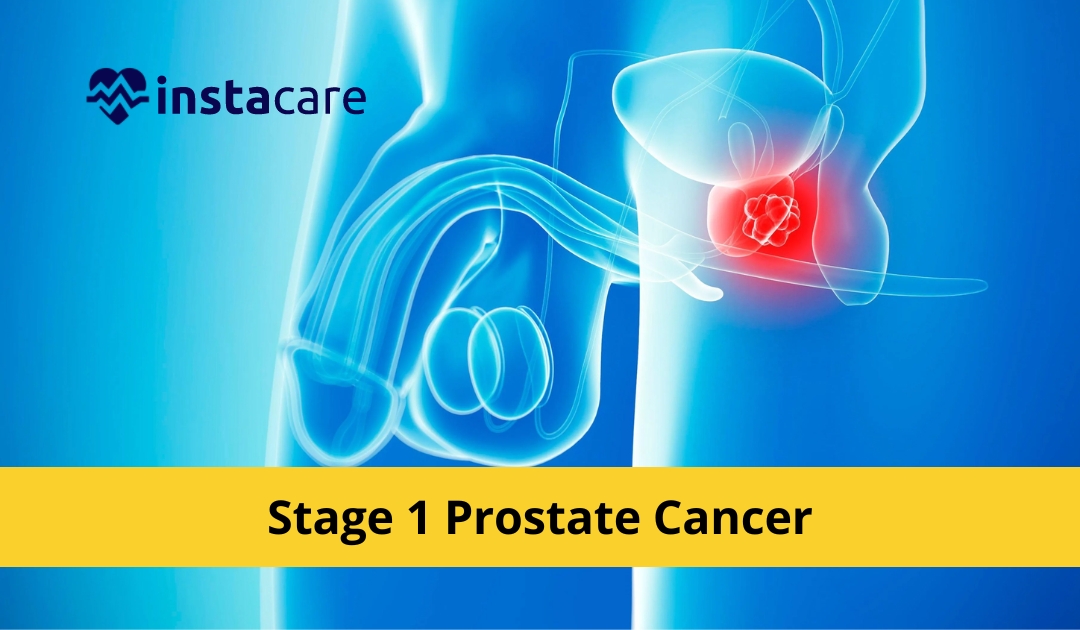If you've been diagnosed with prostate cancer, it can be a scary and overwhelming experience. It’s important to take the time to understand the stages of prostate cancer so that you can make informed decisions about your treatment. Today, we'll focus on stage 1 prostate cancer, discussing the common signs and symptoms, potential causes of this condition and simple strategies for prevention.
What is prostate cancer?
Prostate cancer is a serious threat to men's health and is the second most common type of cancer among them. It typically develops slowly, and stage 1 prostate cancer symptoms are usually quite subtle, such as difficulty urinating, increased frequency of urination, and blood in the urine or semen.
If any of these symptoms are experienced, it's important to speak with a doctor right away for an accurate diagnosis. Early detection is the key to successful treatment; thankfully, there are several options available for those diagnosed with stage 1 prostate cancer. Taking advantage of these options can significantly improve prospects for long-term health and well being.
What are the symptoms of prostate cancer?
Men should be aware of stage 1 prostate cancer symptoms and get an appropriate diagnosis if they experience them. Typical stage 1 prostate cancer symptoms may include difficulty urinating or a decrease in the force of the urinary stream, pain or burning during urination, blood in the urine, or erectile dysfunction.
Additionally, stage 1 prostate cancer may cause frequent urination or an urgency to urinate, pain in the pelvis or rectum, fatigue, lower back pain, and changes in bowel movements. If men experience one or more of these stage 1 prostate cancer symptoms they should consult a medical professional for further evaluation. Early detection is key to ensuring potential treatments are successful and can prevent the spread of any stage of prostate cancer.
View More: 7 Ways To Prevent Low Blood Sugar Overnight
What are the causes of prostate cancer?
Prostate cancer is a stage 1 cancer that can affect men of all ages. The exact cause or causes of prostate cancer are not completely understood, however there are certain things that may put men at an increased risk. These include age (being over 65), family history, obesity, and diet. Exposure to some environmental hazards such as radiation may also increase a man's risk of developing prostate cancer.
Other factors that are under investigation for their potential links to this type of cancer include inflammation and vitamin d deficiency. As research continues, more light may be shed on stage 1 prostate cancer causes and prevention for those potentially at risk.
Risk factors
Prostate cancer is the most common male-specific cancer and is a major health concern. While stage one prostate cancers are generally considered low risk, there are several risk factors for developing this type of cancer. Age plays a large role; men over the age of 50 are at greater risk than younger men.
African american men have a much higher risk level than other ethnicities, particularly in terms of earlier stage diagnoses. Lifestyle choices such as smoking and excessive alcohol consumption can also increase risk levels. Diet can also be a factor in the development of stage 1 prostate cancer, with diets high in red and processed meats increasing the chances of diagnosis.
Furthering the discussion on dietary needs, those who have lower amounts vitamin d, zinc, and omega 3 fatty acid intakes may be at an increased chance for stage 1 prostate cancer. It is important to speak with your doctor if you think you are at an increased risk to ensure regular screenings as early detection is key to successful treatment and recovery outcomes.
Prevention
Prostate cancer at stage 1 can often be prevented with regular doctor's visits and screenings. To lower your risk of prostate cancer, it’s important to keep up with screenings when recommended by your doctor. Regular testing helps detect changes in the prostate that can lead to prostate cancer.
Healthy lifestyle choices also play a huge role in preventing prostate cancer, or any other type of cancer for that matter. Eating plenty of fruits and vegetables, exercising regularly, avoiding processed foods, drinking alcohol in moderation and maintaining an ideal body weight are all excellent prevention techniques.
All men over the age of 50 should have a doctor screen for prostate cancer on an annual basis, as it helps catch it early and reduces the risk of drastic treatments such as surgery or radiation therapy being required.
View More: 10 Foods To Avoid With Diverticulitis
When to see a doctor
Knowing when to see a doctor can be confusing and even intimidating. Certain symptoms warrant a prompt call to your physician, while other ailments may not be as pressing yet still require medical attention. With stage 1 prostate cancer, for example, early detection is key to successful treatment.
If you have experienced recent signs such as pelvic pain or an inability to urinate properly, make sure you consult with a doctor right away. Even if those symptoms aren't directly related to stage 1 prostate cancer, they could still be indicative of an issue that needs care.
To reach the best outcome quickly and safely, it's important to schedule regular check-ups with your healthcare provider - remembering that putting off seeking help can mean the difference between rapid recovery and long-term complications.
Conclusion
Although stage 1 prostate cancer may not have any symptoms, it's important to get regular checkups so that the cancer can be caught early. There are a variety of treatments available for stage 1 prostate cancer, and the best one will depend on the individual case. If you're concerned about your risk of developing prostate cancer, talk to your doctor about things you can do to lower your risk.
Please book an appointment with the Best General Physician in Lahore, Karachi, Islamabad, and all major cities of Pakistan through InstaCare, or call our helpline at 02137136090 to find a verified doctor for your disease.
Source: https://instacare.pk/blog/what-are-the-symptoms-causes-and-prevention-of-stage-1-prostate-cancer











